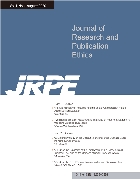- 권한신청
- E-ISSN2733-7146
- KCI Candidate
An Exploratory Study of Research Ethics Training and Ethical Validity
An Exploratory Study of Research Ethics Training and Ethical Validity
Abstract
Purpose: The effectiveness of research ethics education in enabling researchers to think and judge ethically in conducting research. It is a fundamental solution for the establishment of research ethics in the research field, not only for current researchers but also for the next generation. It measured various variables related to ethics that can lead to ethical behavior through a quasiexperimental design to support the reliability of the study. Research Design, data and methodology: Examine prior research on research ethics and explore current research ethics education and practice. It aims to study how to effectively implement and validate specific aspects of research ethics. To investigate, study, and validate research ethics education and research ethics systems. Results: It is defined as the effectiveness or value of training as measured by changes in knowledge and behavior in reaction, learning, behavior, and outcome evaluations measured after learning. Conclusions: For the effectiveness of research ethics education, various support measures need to be mobilized for the spread and establishment of research ethics education. Formalized and continuous research ethics education is needed. It is important that the knowledge acquired through long-term and consistent research ethics training is transferred to ethical behavior in the research field.
- keywords
- Research Ethics, Research Ethics Training, Ethical Validity, Research Ethics Principles
- 투고일Submission Date
- 2024-08-22
- 수정일Revised Date
- 2024-09-06
- 게재확정일Accepted Date
- 2024-09-15
- 다운로드 수
- 조회수
- 0KCI 피인용수
- 0WOS 피인용수















